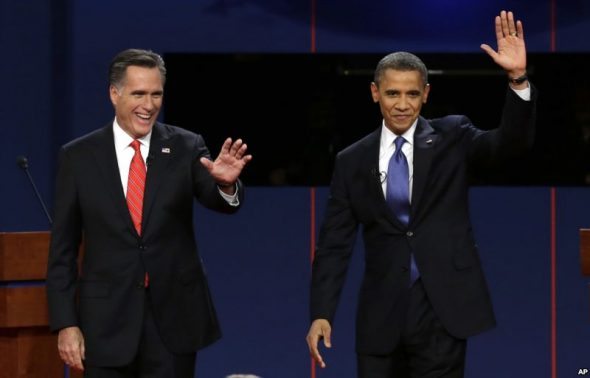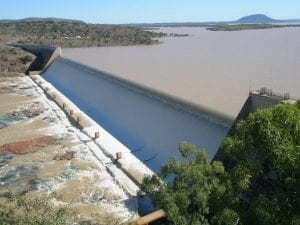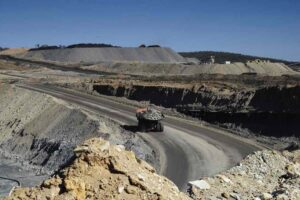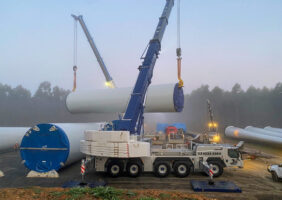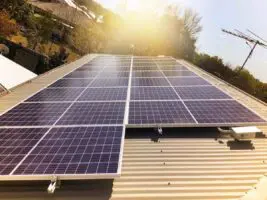Here’s the bulk of a long email I received from the NRDC this week. Very apt, very on point, very useful, and… very objective (it’s centered around exactly what Obama & Romney have said and what’s in their policy proposals). Here you go:
Mitt Romney has promised to roll back basic air and water protections and stop the Environmental Protection Agency from limiting mercury and other toxic power plant emissions. He wants to eliminate federal oversight of oil and gas drilling on federal lands. He opposes new standards that will double our auto mileage and cut our gasoline bills dramatically while simultaneously helping our environment and air quality. He would end support of the dramatic growth we’re making in clean, renewable, made-in-America energy, and instead do whatever possible to expand our dependence on oil, coal and other dirty fuels. Romney has moved his rhetoric toward the center in the debates – a tacit acknowledgment of where the American public is – but he hasn’t shifted his campaign’s anti-environmental positions at all.
President Obama has pledged to continue clean air and water improvements and address climate change instead of ignoring it. He has made it clear he will keep building on the growth in the clean energy industry, creating jobs, clearing our air and decreasing our dependence on foreign oil along the way. He wants to eliminate billions of dollars in oil and gas subsidies, and keep our public lands in the hands of those who are supposed to control them — the American public.
Americans support clean energy and the environment. A recent University of Texas poll, for instance, found that 58 percent of Americans are more likely to vote for a candidate who supports expanding investments in renewable energy than those who don’t. Furthermore, poll after poll shows voters prefer President Obama’s plan to move America toward a more sustainable future. An October poll from USA Today/Gallup gave Obama a 13-point advantage of Romney on energy issues. Even Gov. Romney seems to recognize this, as he has tried to portray himself as an advocate of clean energy despite the content of his platform.
Don’t take our word on all of this. Remember what the candidates themselves said on these issues:
ON ENERGY
President Obama wants to end $4 billion in annual tax breaks for oil and gas companies; expand production of clean, renewable energy and set standards to get 80 percent of the nation’s electricity from clean energy by 2035.
Mitt Romney wants to end bipartisan renewable energy programs like the Production Tax Credit for wind energy; make it easier for oil and coal companies to get permits and turn much of the oversight for energy exploration to state regulators.
PRESIDENT OBAMA
“We’ve got to control our own energy … not only oil and natural gas, which we’ve been investing in, but also we’ve got to make sure we’re building the energy sources of the future, not just thinking about next year, but 10 years from now, 20 years from now. That’s why we’ve invested in solar and wind and biofuels, energy-efficient cars.” (Second presidential debate, Oct. 16, 2012)
“I believe we can create more jobs by controlling more of our own energy. After 30 years of inaction, we raised fuel standards so that by the middle of the next decade, your cars and trucks will go twice as far on a gallon of gas. And today, the United States of America is less dependent on foreign oil than at any time in two decades. (Speech in Miami, Oct. 11, 2012).
MITT ROMNEY
“I will fight for oil, coal and natural gas.” (Second presidential debate, Oct. 16, 2012).
“In place of real energy, Obama has focused on an imaginary world where government-subsidized windmills and solar panels could power the economy.” (OpEd in Columbus Dispatch, March 5, 2012).
ON CLIMATE CHANGE
Mitt Romney has flip-flopped on whether he believes the overwhelming scientific evidence that shows humans are contributing to global warming. He has indicated he doesn’t think climate change is something that can – or needs to be – addressed.
President Obama agrees with science, and knows that climate change is contributing to natural disasters today and hurting our children’s future tomorrow. He wants to continue reducing carbon emissions from cars and power plants and shift toward clean, renewable energy.
PRESIDENT OBAMA
“My plan will continue to reduce the carbon pollution that is heating our planet, because climate change is not a hoax. More droughts and floods and wildfires are not a joke. They are a threat to our children’s future.” (Convention speech, Sept. 6, 2012).
“Climate change is the one of the biggest issues of this generation, and we have to meet this challenge by driving smart policies that lead to greater growth in clean energy generation and result in a range of economic and social benefits.” (Response to National Academy of Sciences Questionnaire Science Debate 2012, Sept. 4, 2012)
MITT ROMNEY
“I’m not in this race to slow the rise of the oceans or to heal the planet.” (Remarks on Meet the Press, Sept. 7, 2012)
“My view is that we don’t know what’s causing climate change on this planet.” (Speech at Consol Energy Center in Pittsburgh PA, Oct. 27, 2011).
ON CLEAN AIR
President Obama supports standards to reduce toxic emissions from power plants and big polluters.
Mitt Romney has said he would block the EPA from limiting carbon dioxide, and opposes EPA limits on emissions of mercury and other toxic power plant emissions. He also has said he wants to change the Clean Air Act, eliminating the health-based science considerations on which the law is based.
PRESIDENT OBAMA
“We shouldn’t be in a race to the bottom, where we try to offer the cheapest labor and the worst pollution standards. America should be in a race to the top. And I believe we can win that race.” (Speech to Congress, Sept. 8, 2011).
“While we must acknowledge the need for differentiated responses, any effort to curb carbon emissions must include the fast-growing carbon emitters who can do more to reduce their air pollution without inhibiting growth.” (Speech to United Nations, May 25, 2011).
MITT ROMNEY
“Now I know there is also a movement to say that carbon dioxide should be guided or should be managed by the Environmental Protection Agency. I disagree with that. I exhale carbon dioxide. I don’t want those guys following me around with a meter to see if I’m breathing too hard.” (Speech in Manchester, N.H., Nov. 18, 2011).
“We have made a mistake is what I believe, in saying that the EPA should regulate carbon emissions. I don’t think that was the intent of the original legislation, and I don’t think carbon is a pollutant in the sense of harming our bodies.” (Remarks at a Derry, NH town hall meeting, July 14, 2011)
ON AUTO MILEAGE STANDARDS
President Obama and his administration orchestrated landmark new vehicle mileage standards that will double the average vehicle mileage to 54.5 by 2015, save consumers $1.7 trillion on gas, reduce oil imports by one-third and cut carbon pollution by the emissions equivalent of 85 million cars in one year. The standards are backed by the auto industry.
Mitt Romney opposes new mileage standards.
PRESIDENT OBAMA
“Thanks to a remarkable partnership between automakers, autoworkers, environmental advocates, and states, we also set in motion a new national policy to increase gas mileage and decrease carbon pollution for all new cars and trucks sold in this country, which is going to save us 1.8 billion barrels of oil.” (Remarks after meeting with energy industry CEOs, July 2, 2009)
“After decades of inaction, we raised fuel-economy standards, so that by the middle of the next decade, our cars will average nearly 55 miles per gallon, almost double what we get today. That means you’ll be able to fill up your car every two weeks instead of every week … that will save the average family about $8,000 at the pump over the life of a car, which is real money.” (Speech at Ohio State University, March 22, 2012).
MITT ROMNEY
“Governor Romney opposes the extreme standards that President Obama has imposed, which will limit the choices available to American families,” said Romney spokeswoman Andrea Saul in a statement to NBC News. (Romney campaign press statement, Aug. 28, 2012).
“Look, the reason these companies got in trouble was because the unions asked for too much; the management gave in too often and made some enormous mistakes of their own; the government put in place CAFE requirements that were disadvantageous for domestic manufacturers,” (Romney statement to press, Feb. 23, 2012).
ON PUBLIC LANDS
President Obama has taken steps to ensure responsible oil and gas production on federal lands, and also has signed legislation that will protect national parks and other federal lands.
Mitt Romney wants to turn oversight for oil and gas production over to state regulators – even if it’s on federal lands. State regulators don’t have the funding or the personnel to oversee drilling on public lands, and regulations would vary from state to state.
PRESIDENT OBAMA
“Our lands have always provided great bounty — food and shelter for the first Americans, for settlers and pioneers; the raw materials that grew our industry; the energy that powers our economy. What these gifts require in return is our wise and responsible stewardship.” (Remarks at the signing of the Omnibus Public Lands Management Act, March 30, 2009)
“You had a whole bunch of oil companies who had leases on public lands that they weren’t using. So what we said was, you can’t just sit on this for 10, 20, 30 years, decide when you want to drill, when you want to produce, when it’s most profitable for you. These are public lands, so if you want to drill on public lands, you use it or you lose it. And so what we did was take away those leases, and we are now re-letting them so that we can actually make a profit.” (Second presidential debate, Oct. 17, 2012)
MITT ROMNEY
“We’re going to have state regulators – not just regulate oil production, gas production on state lands and private lands but also on federal lands.” (Speech in Hobbs, N.M., Aug. 23, 2012).
“So I haven’t studied it, what the purpose is of the land, so I don’t want to say, ‘Oh, I’m about to hand it over.’ But where government ownership of land is designed to satisfy, let’s say, the most extreme environmentalists, from keeping a population from developing their coal, their gold, their other resources for the benefit of the state, I would find that to be unacceptable.” (Romney in editorial board interview with Reno Gazette-Journal, Feb. 2, 2012).
![]() Clean Technica (http://s.tt/1r4YP) – Reproduced with permission.
Clean Technica (http://s.tt/1r4YP) – Reproduced with permission.

